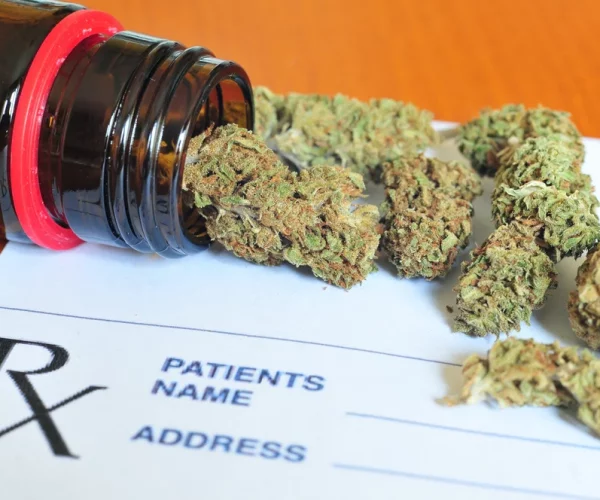Introduction to Medical Marijuana
Medical marijuana marks a groundbreaking shift in the landscape of healthcare, particularly within the realm of psychiatric services. Originating from the cannabis plant, this form of treatment involves utilizing various components of the plant or its primary extracts to address a spectrum of symptoms related to both physical illnesses and mental health disorders.
The use of cannabis for medicinal purposes traces back centuries, with historical records indicating its use in ancient civilizations for a range of ailments.

However, its reintroduction into modern medicine, especially in psychiatric care, has been a recent phenomenon, backed by a growing body of scientific research. This renewed interest is partly due to a better understanding of the plant’s complex chemistry and its potential therapeutic effects on the brain and nervous system.
What Makes Medical Marijuana Unique?
The distinctiveness of medical marijuana stems primarily from its active chemical constituents – THC (tetrahydrocannabinol) and CBD (cannabidiol). THC, the more famous of the two, is renowned for its psychoactive effects, which can alter perception, mood, and consciousness. Conversely, CBD, which does not produce psychoactive effects, is gaining attention for its potential to alleviate symptoms without the ‘high’ typically associated with cannabis.
This unique combination of compounds offers a multifaceted approach to treatment, setting medical marijuana apart from traditional pharmaceuticals. Furthermore, the versatility in its administration methods – be it through oils, tinctures, edibles, or vaporized forms – allows for a more personalized and controlled use, catering to diverse medical needs and preferences while potentially reducing side effects associated with conventional medication forms.
Benefits of Medical Marijuana
Pain Management
Known for its ability to alleviate chronic pain, the cannabinoids in marijuana interact with the body’s pain receptors. This provides relief for various pain types, including neuropathic and arthritis-related pain. It’s a safer alternative to opioids due to a lower risk of dependence and fewer side effects.
Nausea Control and Appetite Stimulation
Particularly effective for chemotherapy patients, medical marijuana reduces nausea and vomiting while stimulating appetite. This helps improve nutrition intake and manage weight, especially in patients undergoing intense medical treatments or those with eating disorders.
Neurological and Mental Health Benefits
Medical marijuana shows promise in reducing seizures in epilepsy and providing relief from certain mental health conditions like anxiety and mood disorders. Its calming effects, under medical guidance, can be beneficial, though individual responses may vary.
Anti-Inflammatory Properties
The anti-inflammatory effects of cannabinoids can significantly benefit inflammatory conditions like Crohn’s disease, irritable bowel syndrome, and rheumatoid arthritis, helping to reduce symptoms like pain and discomfort.
Conditions Treated with Medical Marijuana
- Anxiety Disorders: Medical marijuana has shown effectiveness in reducing anxiety levels, making it a valuable option for treating various anxiety-related conditions.
- Depression: It can act as a mood stabilizer, providing relief for individuals suffering from depression by helping to balance mood fluctuations.
- Post-Traumatic Stress Disorder (PTSD): Medical marijuana is beneficial in alleviating symptoms of PTSD, such as flashbacks, nightmares, and severe anxiety.
- Insomnia and Sleep Disorders: Its sedative properties can help improve sleep quality, making it a useful treatment for insomnia and other sleep-related issues.
- Bipolar Disorder: Some studies suggest that medical marijuana may help in managing mood swings associated with bipolar disorder.

- Eating Disorders: It may aid in appetite regulation and stress relief, potentially benefiting patients with conditions like anorexia or bulimia.
- Obsessive-Compulsive Disorder (OCD): Medical marijuana can help in reducing the severity of OCD symptoms, such as compulsions and anxiety.
- Other Mental Health Issues: This category includes personality disorders, ADHD, stress-related disorders, adjustment disorders, and substance abuse disorders, each requiring unique treatment approaches for effective management.
Safety and Side Effects
While the benefits of medical marijuana are notable, its use must be approached with careful consideration. Side effects, though typically mild, can include dizziness, dry mouth, and, paradoxically, heightened anxiety or feelings of paranoia in some individuals.
The key to effectively managing these risks lies in proper dosing and administration, tailored to each individual’s specific needs and health profile. It’s essential for patients to engage in open and honest communication with their psychiatrists regarding their medical history and any current medications to ensure the safe and effective use of medical marijuana.

Incorporating Medical Marijuana into Your Care Plan
At CareRX, we are committed to a patient-centered approach in incorporating medical marijuana into treatment plans. Our team of healthcare professionals takes the time to thoroughly assess each patient’s suitability for medical marijuana, carefully considering their unique symptoms, treatment history, and overall health.
We understand that each patient’s journey is different, and therefore, emphasize creating a tailored treatment plan that aligns precisely with their individual health needs and treatment goals.